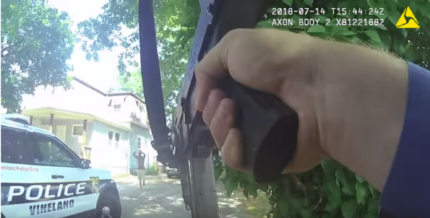As the Atlanta Journal-Constitution reported, current state law allows police officers who face possible indictment to sit in the grand jury room for the duration of the proceedings, and hear all the evidence before making a closing statement without even facing cross examination from grand jurors or the prosecution. No other state in the country has this kind of law. A WSB-TV-Journal-Constitution investigation into 184 deadly Georgia police shootings found that not a single police officer had been criminally prosecuted since 2010.
“When you’re the only state in the country that takes a particular approach, you have a responsibility to take a giant step back and to reassess,” said Rep. Rich Golick, R-Smyrna, sponsor of the legislation, according to WSB-TV. Golick believes the newly enacted law will bring transparency and fairness to the process. “We now can be assured that whatever happens inside the grand jury room will be above question, and that is what matters,” Golick added.
Under the new law, which takes effect starting July 1, officers will be able to sit in the grand jury room only to make a statement concerning the shooting, which will be subject to questions from prosecutors and grand jurors. Further, the hearings will result in a transcript that can be made available to the public in cases where the officer is cleared. However, if an officer is indicted, the transcript and other evidence would not be disclosed to the public, according to the as the Journal-Constitution reported.
However, while the law’s sponsors believe it will now put Georgia in line with the rest of the country, some people believe the bill does not go nearly far enough as it should. Kay Levine, associate professor at Emory University School of Law, told the Associated Press that the public is still concerned about the close relationship that police have with prosecutors in Georgia. “And they are sometimes associated with being on the same team,” she said. While some legislators had favored language in the bill allowing the attorney general to appoint a different prosecutor rather than the local district attorney to investigate the case and avoid conflicts of interests, the measure did not make it into the final version of the bill. “There are people that feel like part of the problem here is that Georgia has a troubling history of cases involving police officers and violence,” she said. The new law will go into effect on July 1.
Further, victims’ families and community activists did not have much input in the creation of the legislation, as the Journal-Constitution reported. “It’s a step in a good direction but there’s still so much further that we need to go,” said Marcus Coleman, a community activist who has been critical of the current law. Coleman thinks the new measure is an improvement, but would like to see something on the lines of California, which banned grand juries in police fatality cases, replacing them with a court hearing with a judge and prosecutors. As Mother Jones reported, California became the first state to take such action last year. Further, according to the Brennan Center, in the wake of the deaths of unarmed Black men by police, New York Gov. Andrew Cuomo signed an executive order appointing the state attorney general as a special prosecutor in cases where unarmed civilians are killed by police officers.
Throughout the country, prosecutors are now facing criticism for failing to indict police officers, and for maintaining a cozy relationship with law enforcement and manipulating the grand jury process. The shooting death of Michael Brown in Ferguson, Mo. is a most prominent example. As FiveThirtyEight reported, the decision by the grand jury in St. Louis County not to indict officer Daren Wilson was unusual, since grand juries nearly always decide to indict, and if prosecutors want an indictment, they will get one. However, indictments for police shootings, though increasing, still remain the exception, as very few police are charged in the more than 1,000 police deadly force incidents that take place each year.
Moreover, some prosecutors are paying the price for their willingness to manipulate the system to protect police officers. Tim McGinty, the chief prosecutor in Cuyahoga County, was voted out of office for failing to prosecute the police officers in the Tamir Rice case. The grand jury refused to indict in the death of a 12-year old boy playing with a toy gun in Cleveland. Similarly, Anita Alvarez–the Cook County prosecutor who failed to act in the police shooting death case of Laquan McDonald for over a year before taking action—was defeated in the Democratic primary by attorney Kim Foxx–a Black woman who grew up in the Chicago housing projects.
According to Campaign Zero–the #BlackLivesMatter police accountability group– a number of reforms are needed to address police shootings where civilians are killed or seriously injured, including independent investigators and prosecutors, and a state-level Special Prosecutor’s Office for police violence cases. “Local prosecutors rely on local police departments to gather the evidence and testimony they need to successfully prosecute criminals. This makes it hard for them to investigate and prosecute the same police officers in cases of police violence,” the organization states on its website. “These cases should not rely on the police to investigate themselves and should not be prosecuted by someone who has an incentive to protect the police officers involved.”
Further, as VICE News reported, the U.S. is the only country in the world in which prosecutors are elected, making the position an inherently political one. “There is a natural conflict of interest when district attorneys – who typically work closely with the police to bring cases against suspected criminals – are faced with prosecuting those same officers. District attorneys count on officers’ testimony to support their cases during trials of alleged criminals,” said Human Rights Watch in a 1998 report. “There is a particular reticence in bringing charges against officers who have been ‘productive’ and who have worked closely with the district attorney’s office. In some jurisdictions, district attorneys are elected and are aware that the powerful police unions and their supporters may withdraw their support if a police officer is prosecuted.”



